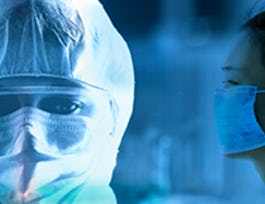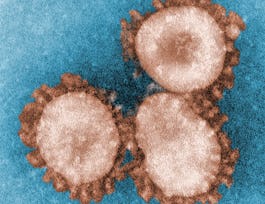Not so long ago, it was almost guaranteed that you would die of an infectious disease. In fact, had you been born just 150 years ago, your chances of dying of an infectious disease before you've reached the tender age of 5 would have been extremely high.


Epidemics - the Dynamics of Infectious Diseases
Taught in English
Some content may not be translated
66,505 already enrolled
(1,519 reviews)
Skills you'll gain
Details to know

Add to your LinkedIn profile
8 quizzes
See how employees at top companies are mastering in-demand skills


Earn a career certificate
Add this credential to your LinkedIn profile, resume, or CV
Share it on social media and in your performance review

There are 10 modules in this course
Welcome to Epidemics: the Dynamics of Infectious Diseases. This course will teach you about the variety of parasitic organisms that infect humans, animals, and plants, how these parasites spread through populations, and the various methods that we employ to control them.
What's included
3 readings
In the first module, you will learn about the organisms that can infect us and make us sick: pathogens. We will first take a look at the various types of pathogens that exist, and then learn about what it means to be infectious, and what it means to cause disease. After that, we will cover the various methods by which pathogens can transmit from one person to the next, thereby causing an epidemic. You will learn about the most important number in all of epidemiology, R0, and why this number is so important. Finally, we will learn that microorganisms are not always harmful, but can be beneficial to us as well.
What's included
7 videos1 reading1 quiz
The second module of the course covers host factors that determine the outcome of infection. We will first focus on host immunity and present both the general immune capabilities—the innate immune response—that are encoded in our genes and that provide the initial response to infection and the adaptive immune response, which arises from highly specialized cells that protect against a specific pathogen. You will then learn about the ways that pathogens circumvent these two types of immunity and consider other factors that can contribute to an individual becoming infected or diseased—including genetic factors, other microbes, and how social and emotional factors influence immunity. We will then consider how infection with a microorganism causes disease and how public health officials determine whether a disease outbreak is caused by an infectious organism.
What's included
7 videos1 reading1 quiz
The third module of the course covers ecological factors that influence the dynamic patterns of infectious disease. We will discuss the conditions under which a pathogen can drive its host to extinction. We will look at how the demography of the host may allow the pathogen to persist in some populations but not others. We will talk about how host and pathogen characteristics interact to shape different temporal patterns of disease incidence at the population level and discuss the ecological consequences of infecting more than one host species.
What's included
9 videos1 reading1 quiz
Where humans live and how they are connected to each other, have strong effects on how infectious diseases can spread. In this module, you will learn about some of the related key concepts of epidemiology. After looking at some fascinating history, we’ll learn about social networks as the ultimate “road map” on which diseases can travel and we’ll talk about how the structure of the network can influence disease dynamics. After that, we’ll cover three topics that all affect infectious disease epidemiology in dramatic ways: human transport systems, population density and so-called superspreaders - individuals who can spread a disease to dozens or even hundreds of other individuals. We’ll close by identifying what information is required for disease surveillance.
What's included
8 videos1 reading1 quiz
In module 5 of the course, you will learn about vaccination, one of the most common approaches to the prevention of epidemics. We'll first put vaccination in the context of the many types of public health interventions that that can be used to prevent or treat disease. After that you will learn about the development of the first vaccine, how vaccines work to prevent infection, and the impact that vaccination has had on the prevention of disease worldwide. After that, you will learn about how vaccination can provide protection to everyone, even the unvaccinated, in the population through "herd immunity" and how we can use the structure of social networks within populations to more efficiently achieve this herd protection. Finally we'll learn about how individuals choices about whether or not to get vaccinated can lead to impacts across the whole of the population.
What's included
7 videos1 reading1 quiz
In module 6 of the course, you will learn about mechanisms involved in controlling epidemics. In these lectures, we will discuss what control mechanisms are trying to do, such as breaking the chain of transmission, and many ways by which animals and humans attempt to achieve control. These means include pharmaceutical and non-pharmaceutical interventions, appearing at individual or population levels. We will describe examples of great successes in eradication, and the reasons why control efforts fail.
What's included
10 videos1 reading1 quiz
In module 7 of the course, we’ll look at so-called emerging infectious diseases. These are diseases that are causing new problems. They include infectious agents that are new to humanity, but also infectious agents that were once controlled and are now returning, particularly those that are evolving around formerly very effective public health tools like drugs and vaccines. This means much of the week involves a discussion of evolution. We will look at these emerging diseases and ask, where do they come from and what can be done about them? You will learn about new ideas for managing evolution, and some of the societal challenges involved. We will also look at the related question of how some diseases evolve to be nicer or nastier to their hosts.
What's included
7 videos1 reading1 quiz
In this final module we explore the global context of epidemics. The world is rapidly changing with the global population increasing and the speed of travel and extent of globalization piling on the pressure of infectious diseases. In this week we set out first to explore a textbook example of disease shaped by the conditions presented by modern living: the disease SARS. We will see how high density living in cities coupled with links to wildlife diseases through markets can create a pandemic. We then explore traditional methods of disease surveillance and then more recent ones afforded to us by the web and networks made possible through google, twitter and other social media. Important to this global view is human behavior, our evolving culture and health. We will also consider emerging disease and the global pattern of diseases across our recent history and how from our earliest beginnings of global travellers we have affected the spread of diseases. Finally, we discuss disease of our food plants and how models of disease spread are developed to promote better global health. As a postscript to the course we ask the questions, so beloved of modern media, could we become zombies?
What's included
9 videos1 reading1 quiz
The videos accessible in this module are responses to questions that have been posed in previous sessions of this course. We invite you to look around here as an additional resource to answer questions you might have yourself or explore topics that pique your interest.
What's included
36 videos
Instructors



Offered by
Recommended if you're interested in Basic Science

The University of Hong Kong

University of Geneva

American Museum of Natural History

Johns Hopkins University
Why people choose Coursera for their career




Learner reviews
Showing 3 of 1519
1,519 reviews
- 5 stars
80.84%
- 4 stars
16.72%
- 3 stars
1.77%
- 2 stars
0.39%
- 1 star
0.26%
New to Basic Science? Start here.

Open new doors with Coursera Plus
Unlimited access to 7,000+ world-class courses, hands-on projects, and job-ready certificate programs - all included in your subscription
Advance your career with an online degree
Earn a degree from world-class universities - 100% online
Join over 3,400 global companies that choose Coursera for Business
Upskill your employees to excel in the digital economy
Frequently asked questions
Access to lectures and assignments depends on your type of enrollment. If you take a course in audit mode, you will be able to see most course materials for free. To access graded assignments and to earn a Certificate, you will need to purchase the Certificate experience, during or after your audit. If you don't see the audit option:
The course may not offer an audit option. You can try a Free Trial instead, or apply for Financial Aid.
The course may offer 'Full Course, No Certificate' instead. This option lets you see all course materials, submit required assessments, and get a final grade. This also means that you will not be able to purchase a Certificate experience.
When you purchase a Certificate you get access to all course materials, including graded assignments. Upon completing the course, your electronic Certificate will be added to your Accomplishments page - from there, you can print your Certificate or add it to your LinkedIn profile. If you only want to read and view the course content, you can audit the course for free.
You will be eligible for a full refund until two weeks after your payment date, or (for courses that have just launched) until two weeks after the first session of the course begins, whichever is later. You cannot receive a refund once you’ve earned a Course Certificate, even if you complete the course within the two-week refund period. See our full refund policy.







